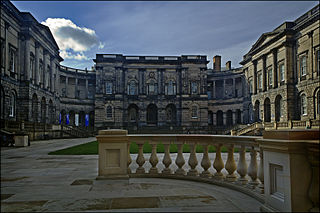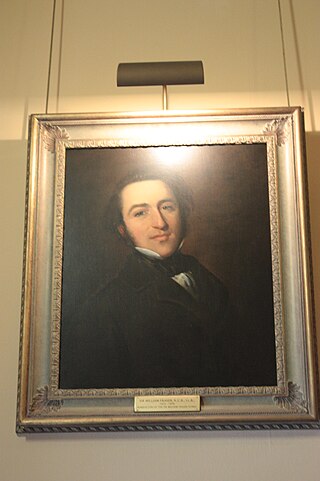Kenneth Gilbert Cameron Reid CBE, FBA, FRSE, WS, (born 1954) is a legal scholar and former law commissioner who holds the Chair of Scots Law at the University of Edinburgh School of Law. [1]
Contents

Kenneth Gilbert Cameron Reid CBE, FBA, FRSE, WS, (born 1954) is a legal scholar and former law commissioner who holds the Chair of Scots Law at the University of Edinburgh School of Law. [1]

Kenneth Reid was educated at the independent Loretto School and St John's College, Cambridge where he studied history, then later at the University of Edinburgh where he studied law. [2] It is here where he first met George Gretton, with whom he would collaborate with extensively during his academic career. [3] After working as a solicitor, he became a lecturer in law at the University of Edinburgh in 1980 where he was subsequently appointed to the Chair of Property Law in 1994 and then the Chair of Scots Law in 2008.
Reid's seminal work is his The Law of Property in Scotland published in The Stair Memorial Encyclopaedia volume 18 in 1993 and as a book in 1996. He has published widely on property law, as well as on trusts and succession. He has edited several books with Professor Reinhard Zimmermann, including a volume on the history of Scottish private law, a volume comparing Scottish and South African private law and several volumes on aspects of comparative succession law.
In 1995, he was appointed to the Scottish Law Commission as Commissioner to direct major reforms in property law. He served as a Commissioner until 2005 and was responsible for the reports which resulted in the Abolition of Feudal Tenure etc. (Scotland) Act 2000, the Title Conditions (Scotland) Act 2003 and the Tenements (Scotland) Act 2004. In addition he authored the discussion papers which led ultimately to the Land Registration etc. (Scotland) Act 2012. He was appointed CBE for his law reform work. In 2015 he was awarded an Honorary Doctorate from the University of Cape Town.

Delict in Scots law is the area of law concerned with those civil wrongs which are actionable before the Scottish courts. The Scots use of the term 'delict' is consistent with the jurisdiction's connection with Civilian jurisprudence; Scots private law has a 'mixed' character, blending together elements borrowed from Civil law and Common law, as well as indigenous Scottish developments. The term tort law, or 'law of torts', is used in Anglo-American jurisdictions to describe the area of law in those systems. Unlike in a system of torts, the Scots law of delict operates on broad principles of liability for wrongdoing: 'there is no such thing as an exhaustive list of named delicts in the law of Scotland. If the conduct complained of appears to be wrongful, the law of Scotland will afford a remedy even if there has not been any previous instance of a remedy being given in similar circumstances'. While some terms such as assault and defamation are used in systems of tort law, their technical meanings differ in Scottish delict.

Edinburgh Law School, founded in 1707, is a school within the University of Edinburgh, Scotland, United Kingdom dedicated to research and teaching in law. It is located in the historic Old College, the original site of the University. Two of the twelve currently sitting Supreme Court of the United Kingdom justices are graduates of Edinburgh, including the current President and Deputy President.
In Scots law, jus relictae is the right of the surviving spouse in the moveable property of the deceased spouse. Jus relictae is the term used for a surviving wife, and jus relicti is the term used for a surviving husband. The similar right for any surviving children is referred to as legitim.

The Scottish Law Commission is an advisory non-departmental public body of the Scottish Government. It was established in 1965 to keep Scots law under review and recommend necessary reforms to improve, simplify and update the country's legal system. It was established by the Law Commissions Act 1965 at the same time as the Law Commission in England and Wales.

Registers of Scotland (RoS) is the non-ministerial department of the Scottish Government responsible for compiling and maintaining records relating to property and other legal documents. They currently maintain 20 public registers. The official responsible with maintaining the Registers of Scotland is the Keeper of the Registers of Scotland. By ex officio, the Keeper of the Registers of Scotland is also the Deputy Keeper of the Great Seal of Scotland. The Keeper of the Registers of Scotland should not be confused with the Keeper of the Records of Scotland.
George Lidderdale Gretton WS FRSE is a Scottish lawyer and academic and, from May 2006 to May 2011, was a Commissioner of the Scottish Law Commission.

Sir William N. Fraser, was a solicitor and notable expert in ancient Scottish history, palaeography, and genealogy.

George Wilson PRSSA FRSE was a 19th-century Scottish chemist and author. He was Regius Professor of Technology at the University of Edinburgh, and the first Director of the Industrial Museum of Scotland.

The inter regalia are the rights falling to the Crown in Scots Property law. The term derives from Latin inter (among) and regalia.
Dame Seona Elizabeth Reid is a Scottish arts administrator who was director of the Glasgow School of Art from 1999 to 2013, and former director of the Scottish Arts Council from 1990 to 1999.

Scots property law governs the rules relating to property found in the legal jurisdiction of Scotland. As a hybrid legal system with both common law and civil law heritage, Scots property law is similar, but not identical, to property law in South Africa and the American state of Louisiana.

Scots contract law governs the rules of contract in Scotland.

The Chair of Conveyancing was a Professorship at the University of Glasgow, active until 2014. It was founded in 1861 and endowed by the Faculty of Procurators in Glasgow. It was a part-time post, and holders were generally solicitors in private practice. The last holder of the post was Professor Robert Rennie, before he retired from the role in 2014.

Scots law is the legal system of Scotland. It is a hybrid or mixed legal system containing civil law and common law elements, that traces its roots to a number of different historical sources. Together with English law and Northern Ireland law, it is one of the three legal systems of the United Kingdom.

The history of Scots law traces the development of Scots law from its early beginnings as a number of different custom systems among Scotland's early cultures to its modern role as one of the three legal jurisdictions of the United Kingdom. The various historic sources of Scots law, including custom, feudal law, canon law, Roman law and English law have created a hybrid or mixed legal system, which shares elements with English law and Northern Irish law but also has its own unique legal institutions and sources.
Sir Ernest MacLagan Wedderburn was a Scottish lawyer, and a significant figure both in the civic life of Edinburgh and in the legal establishment. He held the posts of Professor of Conveyancing in the University of Edinburgh (1922–35), Deputy Keeper of the Signet (1935–54), and Chairman of the General Council of Solicitors (1936–49), the forerunner to the Law Society of Scotland, and chaired the latter 1949/50. He was also an enthusiastic amateur scientist, and first Treasurer then Vice President of the Royal Society of Edinburgh.
William Adam Wilson FRSE was a Scottish lawyer who served as Professor of Scots Law at the University of Edinburgh. As an author he was known as W. A. Wilson and informally as Bill Wilson.

A disposition in Scots law is a formal deed transferring ownership of corporeal heritable property. It acts as the conveyancing stage as the second of three stages required in order to voluntarily transfer ownership of land in Scotland. The three stages are:

Land registration in Scots law is the system of public registration of land, and associated real rights. Scotland has one of the oldest systems of land registration in the world. Registration of deeds is extremely important as it constitutes the third stage of the creation and transfer of real rights.

Possession in Scots law occurs when an individual physically holds property with the intent to use it. Possession is traditionally viewed as a state of fact, rather than real right and is not the same concept as ownership in Scots law. It is now said that certain possessors may additionally have the separate real right of ius possidendi. Like much of Scots property law, the principles of the law of possession mainly derive from Roman law.